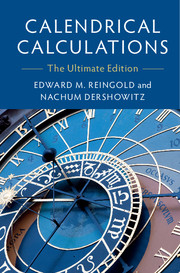Cambridge University Press has published a new edition of Edward M. Reingold’s and Nachum Dershowitz’s Calendrical Calculations. Reingold is professor of computer science and applied mathematics at Illinois Tech, and Dershowitz is professor of computer science at Tel Aviv University in Israel.
There are myriad historical and existing calendars. Our Georgian calendar is based on the sun and includes leap days to make up for the fact that it takes the Earth just over 365 days, or 365.24219 days, to travel around the sun. Other calendars are based on the moon (Persian/Iranian) or a combination of the moon and sun (Chinese/Hebrew). It can be difficult to convert dates between them.
 First published in 1997, Calendrical Calculations puts calendars into algorithmic form to make conversion easier and to determine secular and religious holidays. It is aimed at programmers, astronomers, and other calendar enthusiasts. Owen Gingerich, professor emeritus of astronomy and of the history of science at Harvard University and a senior astronomer emeritus at the Smithsonian Astrophysical Observatory, called Calendrical Calculations “the definitive reference on calendrical structures.”
First published in 1997, Calendrical Calculations puts calendars into algorithmic form to make conversion easier and to determine secular and religious holidays. It is aimed at programmers, astronomers, and other calendar enthusiasts. Owen Gingerich, professor emeritus of astronomy and of the history of science at Harvard University and a senior astronomer emeritus at the Smithsonian Astrophysical Observatory, called Calendrical Calculations “the definitive reference on calendrical structures.”
The new edition includes algorithmic presentations of more than three dozen calendars. It now covers UNIX dates, Italian time, the Akan, Icelandic, Saudi Arabian Umm al-Qura, and Babylonian calendars. Reingold and Dershowitz rewrote several of the astronomical functions to produce more accurate results and to include calculations of moonrise and sunset. The work includes LISP code for all the algorithms in machine-readable form.
Reingold has worked in the design and analysis of algorithms for over 45 years and was named a fellow of the Association for Computing Machinery in 1996 for “significant research and educational contributions to data structures and the analysis of combinatorial algorithms.”

